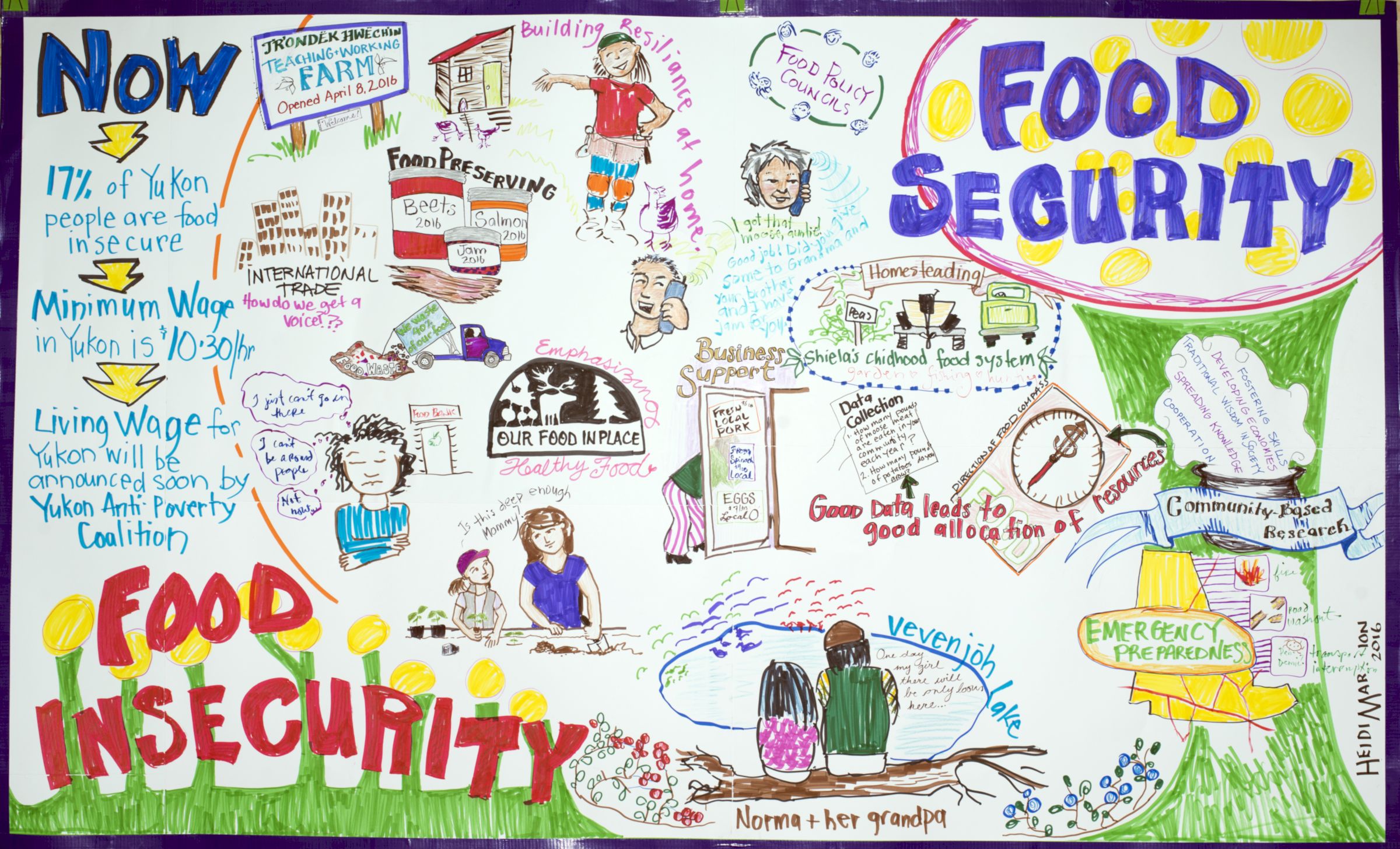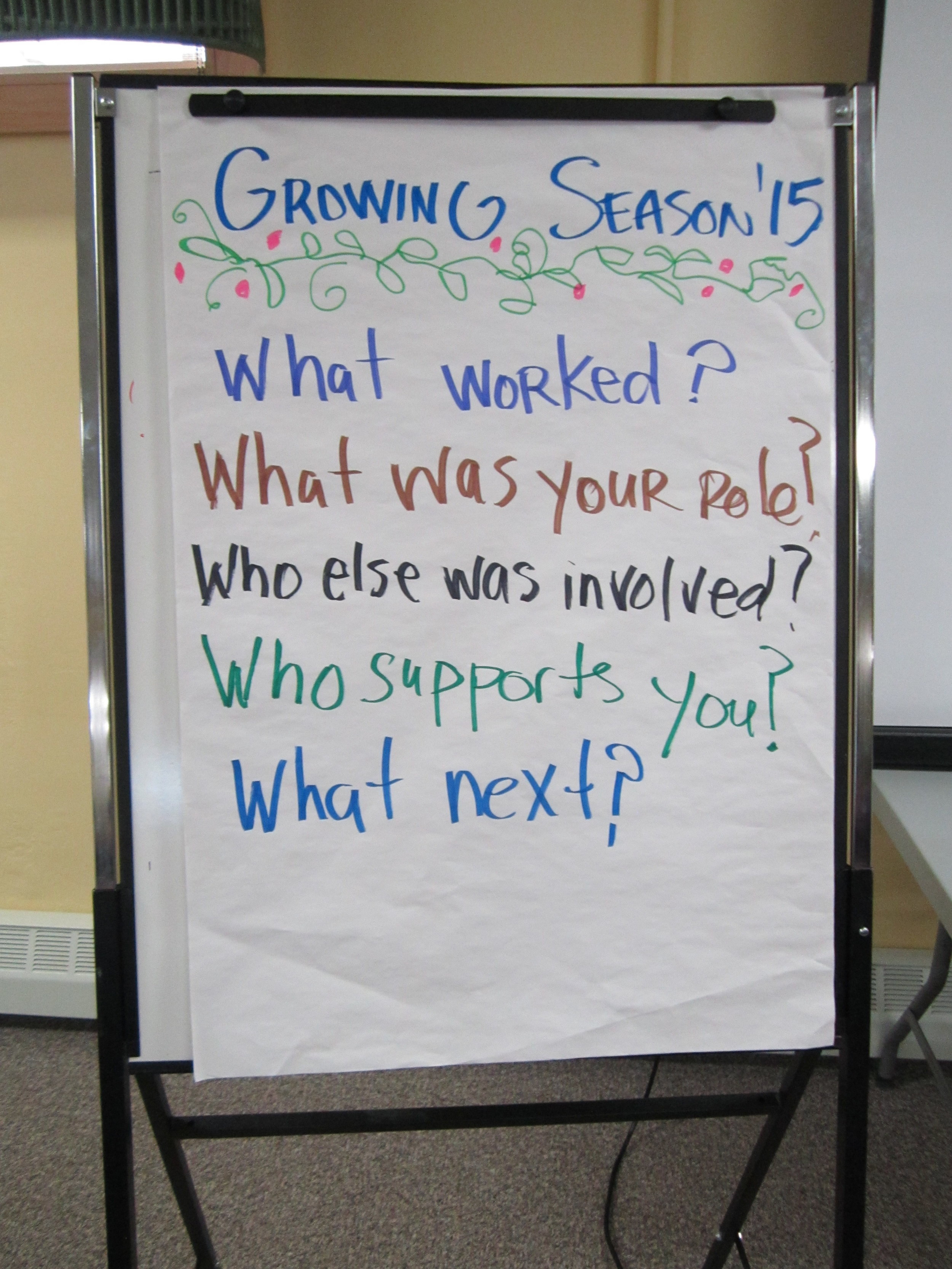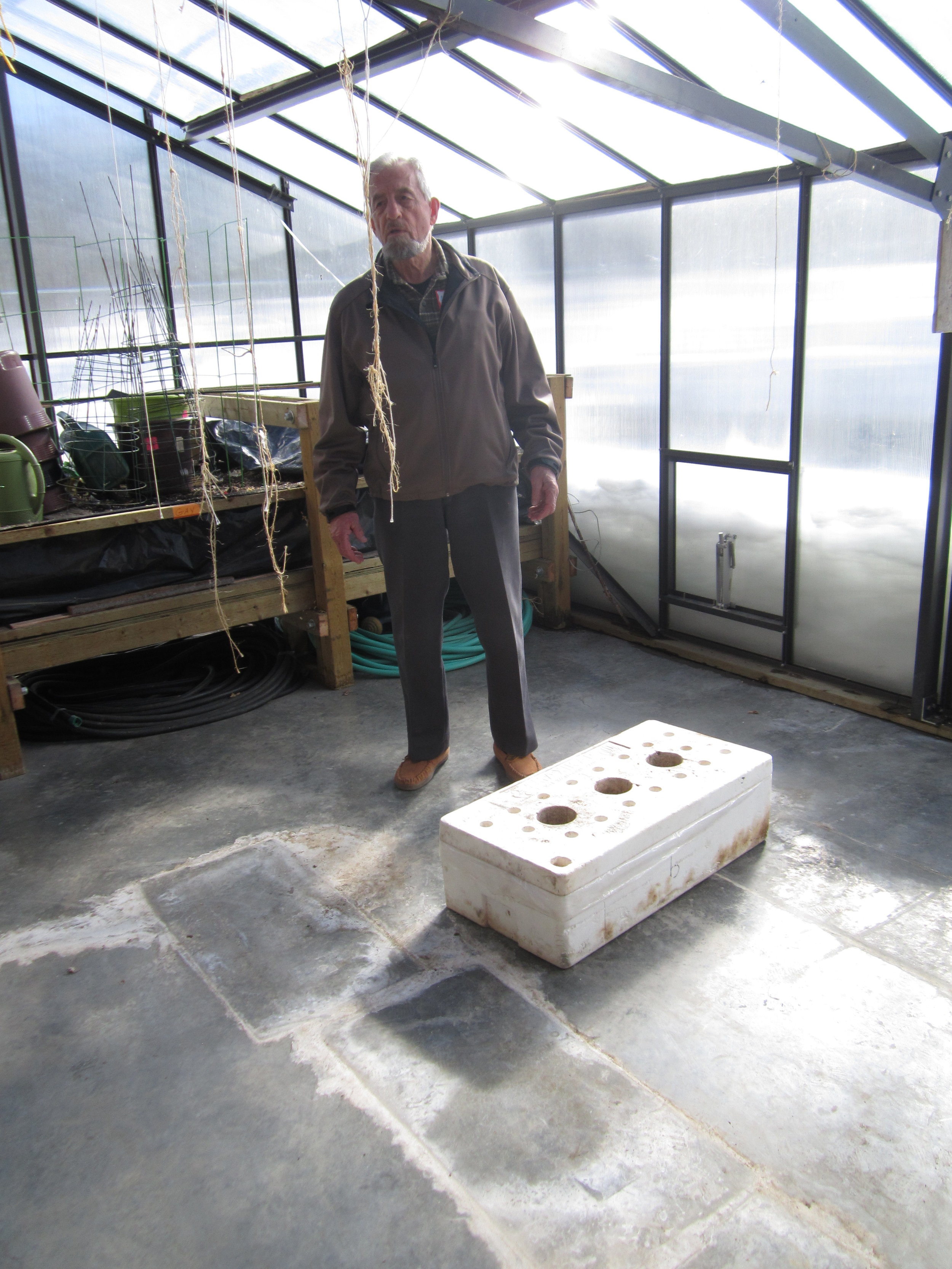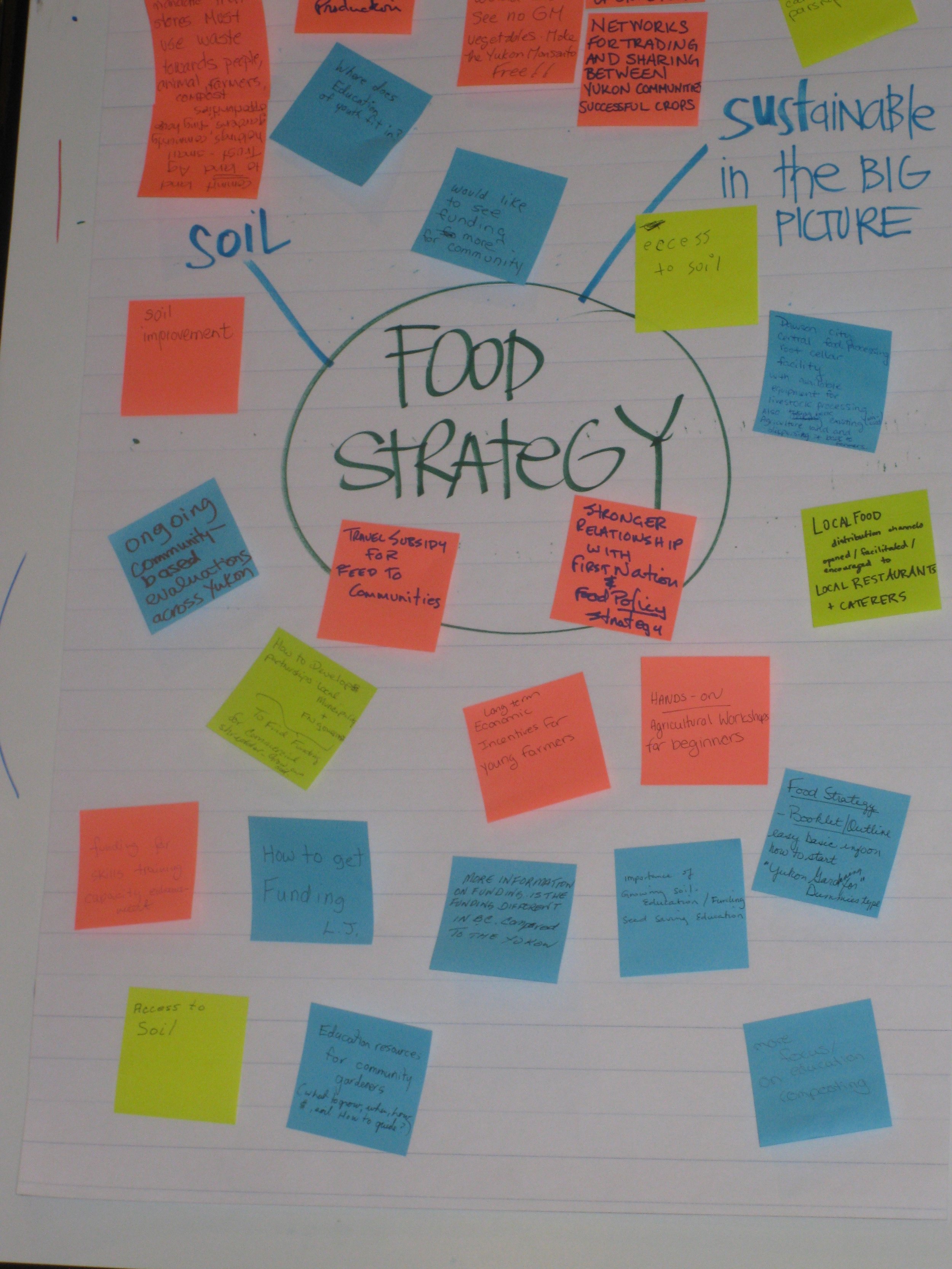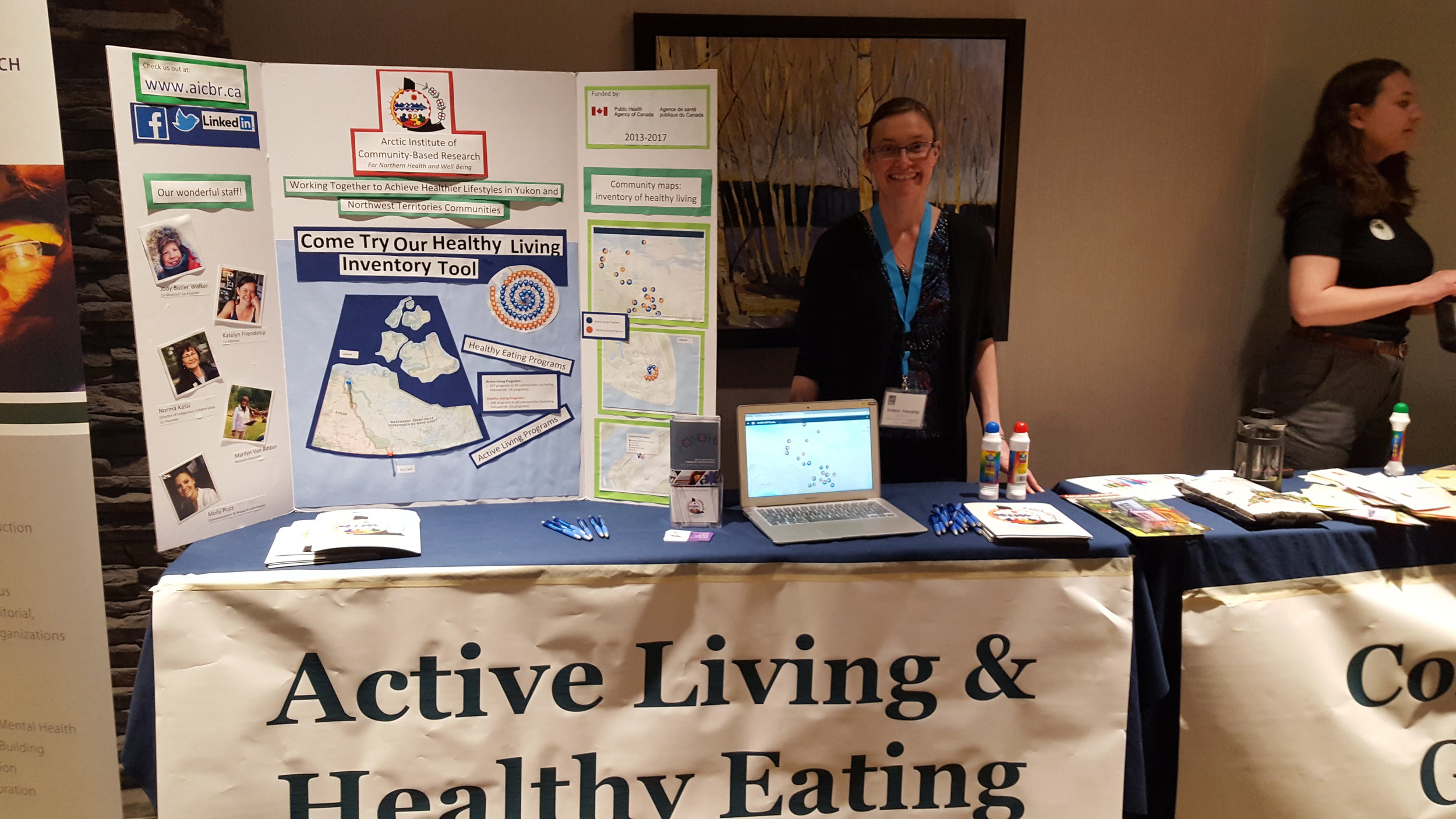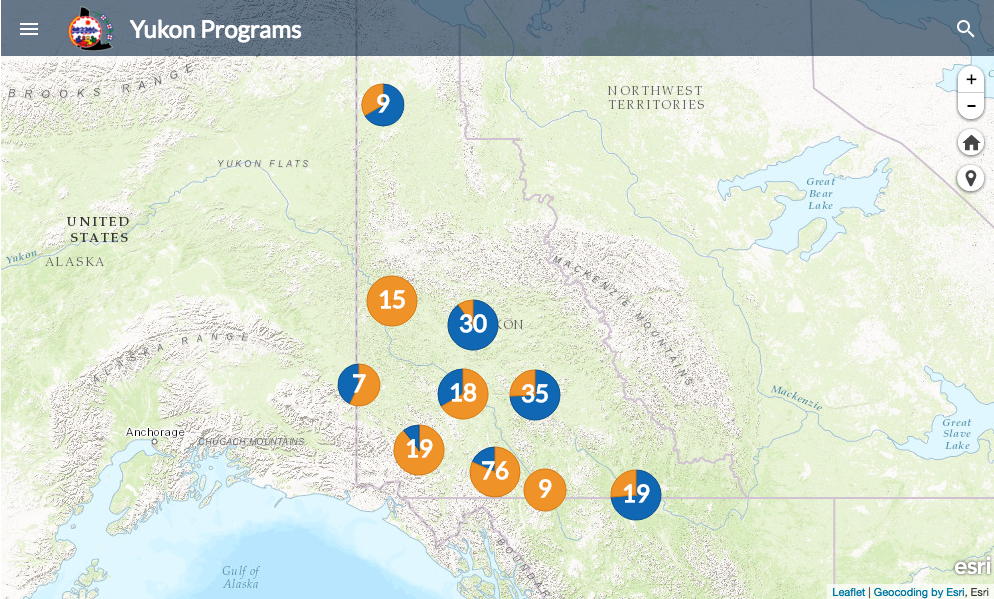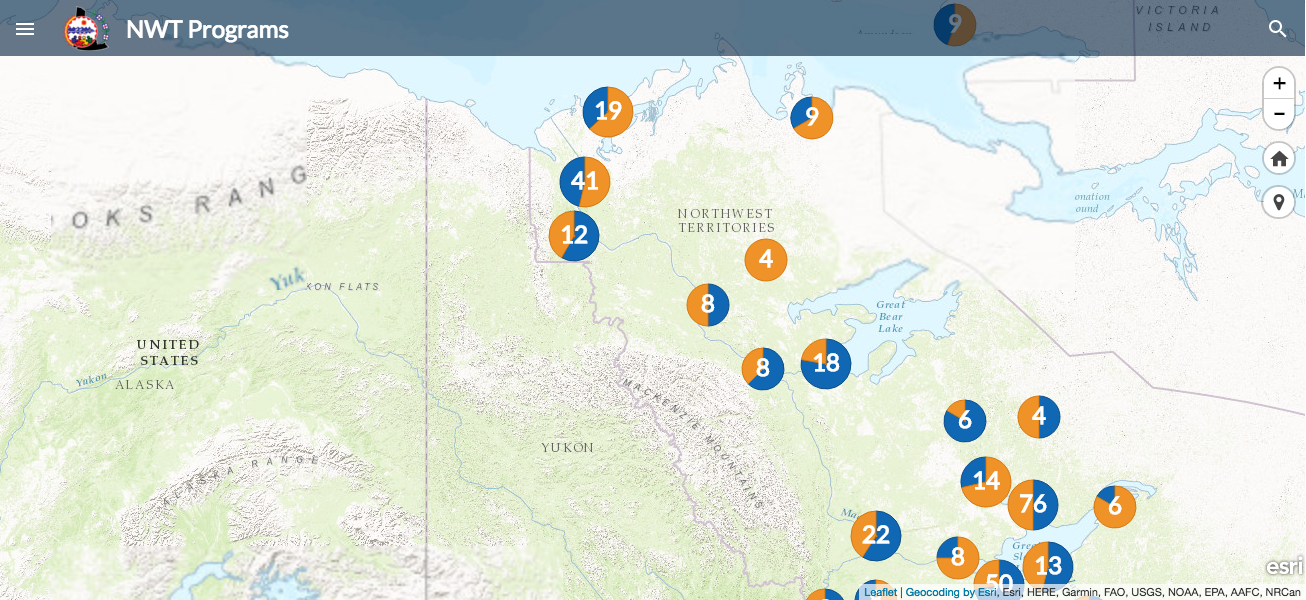Celebrating Ten Years of Working Together Towards Northern Health and Well-Being!
February 14th, 2017 marked the Arctic Institute of Community-Based Research's (AICBR) ten-year anniversary. AICBR was originally established in 2007 as the Arctic Health Research Network – Yukon, which was part of a tri-territorial health research network linking the Yukon, Northwest Territories, and Nunavut to develop health research capacity in the North and advance progress on northern health priorities.
Co-founded by Northerners Jody Butler Walker and Norma Kassi, a Vuntut Gwitchin citizen from Old Crow, AICBR has grown and evolved over the last ten years, developing many successful, strong partnerships and relationships along the way, and completing many projects. In all our work, we continue to strive towards:
- meaningful engagement of northerners in health, natural and social science research focused on northern priorities, with results contributing to all northerners living healthy lives;
- serving as a resource for northern health, natural and social science research activities with Indigenous and non-Indigenous communities;
- developing community driven, northern-led, health and wellness research capacity;
- working in respectful ways with Indigenous and non-Indigenous communities, non-profit organizations, Indigenous, municipal, territorial and federal governments and the private sector to facilitate opportunities for intersectoral collaboration on complex health and wellness issues;
- building effective partnerships with universities and colleges to develop and strengthen community-based research capacity and the co-production of knowledge; and
- upholding ethical guidelines for best practices in northern Indigenous and non-Indigenous health and wellness research.
For this occasion, we wanted to take the time to reflect on the work we’ve been able to achieve together with our partners over the last decade and celebrate the many success stories that act to highlight the incredible strength and resilience of Northern people and environments. We'd also like to acknowledge all of our funders and advisors, whose support has helped push the bar on issues of northern importance. We look forward to many more productive years working with and alongside you to continue to advance and sustain health and well-being in the North!
Some of the AICBR team and board at Food Secure Canada's 9th National Assembly in Toronto, Oct 2016.
(From left): Katelyn Friendship, Molly Pratt, Norma Kassi, Jody Butler Walker, and board member Mary Jane Johnson; (Missing from photo): Marilyn Van Bibber and Beverly Baker.
Select Highlighted Projects
Healthy Lifestyles & Chronic Disease Prevention:
Working Together to Achieve Healthier Lifestyles in Yukon & Northwest Territories’ Communities project (2013 – 2017)
Funded by the Public Health Agency of Canada’s Innovation Strategy
Our ‘Working Together’ project involves identifying ways to support, promote and facilitate healthier lifestyles in communities, through the strengthening of partnerships between organizations, governments, and communities. We have been particularly interested in sustainability and have been working with others to understand the factors that contribute to maintaining lasting long-term outcomes in our northern communities. As lead and support for the project, AICBR is incorporating a Collective Impact approach, working with those who share a common agenda and offer mutually reinforcing activities, and is facilitating ongoing communication between partners.
Some outcomes from this project:
- Increased healthy eating and active living behaviours by supporting programs such as Yukon-based “Kids in the Kitchen”, Mayo's “Walk the Peel” and "Healthy U" initiatives, Selkirk First Nation family cooking classes, and the E’Sah Summer Project in Ross River
- A baseline inventory of active living and healthy eating programs for Yukon and Northwest Territories was completed and integrated into a Healthy Living Inventory and Mapping Tool – currently being updated for 2016 (http://www.aicbr.ca/healthy-living-inventory/)
- Community Gardener Gatherings in both Yukon and Northwest Territories (more details below)
- [Upcoming] Working Together to Grow More 4: Growing a Food Secure Yukon (March 14-15th, 2017)
- Working Together to Grow More 3: Community Garden Gathering (2016) [pdf]
- Working Together to Grow More 2: Community Gardeners & Economic Development Gathering (2015) [pdf]
- Ecology North Fall Harvest Fair and North Slave Community Gardening Gathering (NWT) (2015) [pdf & video]
- Working Together to Grow More: Yukon Community Garden Gathering (2014) [pdf]
- Hosted the first Yukon Food Security Roundtable (and related events), bringing together multiple sectors to collectively analyze the Yukon food system and to plan for a more food secure Yukon (details below)
- Co-facilitation of Food Network Yukon bi-monthly meetings with the Yukon Anti- Poverty Coalition
- Co-host of Northern Food Network (NFN) with Food Secure Canada; the NFN is a pan-Canadian network of Northerners and others working in the areas of northern food security, environment, health, and agriculture, focused on contributing lessons rooted in and from the North to inform an equitable, sustainable and relevant national food policy
- Support to the development of a Yellowknife Food Charter and currently exploring options for Whitehorse Food Charter
- Increased connectivity and collaboration between multiple sectors
- Increased understanding of factors of sustainability and scalability of successful health interventions through a community-based research lens and in a rural, remote, Northern context
- Case Study: Success Stories from Ndilo and Dettah How School Gardens and Community Gardens are Growing Healthier Communities in the NWT
- Case Study: Kids in the Kitchen
- Case Study: Weekday Warriors After-School Program
- Case Study: Growing Together at Weledeh: Weledeh School Garden Program, NWT
- The development of this initiative included work that contributed to identifying potential partners and successes in the Yukon, as summarized in the report: "Celebrating Our Stories - Building a Healthier Yukon Together" [pdf]
Community Gardener Gatherings (2014 – 2017)
Funded by the Public Health Agency of Canada, Yukon Government’s Community Development Fund, Recreation and Parks Association of the Yukon, Government of Canada’s Growing Forward 2, Council of Yukon First Nations, and Growers of Organic Food Yukon
We’ve hosted three successful Community Gardener Gatherings and are gearing up for our fourth, March 14 -15th called “Working Together to Grow More 4: Growing a Food Secure Yukon”. These workshops are a time for community gardeners from across the Yukon to network, learn from experts in the field of growing, share their knowledge, and pick up useful tips, tricks and resources. Participants decide the focus of the gathering; previous topics of focus have included community gardening & economic development, growing and management techniques, weather patterns and compost building. (Reports above)
Yukon Food Security Roundtable (2016)
Funded by the Public Health Agency of Canada, Yukon Government’s Community Development Fund and Health Investment Fund, and sponsored by Air North
AICBR hosted three food security events May 18th - 19th, 2016: a Yukon Food Security Roundtable, an Evening on Food Security, and a Food Security Open House. The Yukon Food Security Roundtable was an opportunity for delegates from multiple sectors across the territory to come together to share current food security-related activities, identify factors that limit or facilitate food access and availability for Yukon residents, and to prioritize next steps. The Roundtable welcomed participation from 79 delegates from across the territory, including representation from 16 Yukon communities including Yukon First Nations, Indigenous governments, municipal, territorial and federal government representatives, the non-profit sector, food producers, researchers and concerned citizens, in addition to academics from Canada and the USA. On the final afternoon, AICBR opened up the Roundtable space to the public, with an Open House. Here, members of the public were encouraged to share their voice and experiences on the topic of food security. We hosted An Evening on Food Security in partnership with the Pierre Elliott Trudeau Foundation. Four speakers from across Canada and Alaska shared their work related to food security at this very well attended event.
A vision statement and ranked priorities and values for a food secure Yukon as well as 50 recommendations for how to achieve the top five were developed from roundtable discussions and group work, as follows:
Vision Statement:
“We believe in a food secure, food producing and food sharing Yukon where the land and the waters are harvested and protected. Through the wise use of resources, every person has dignified, affordable access to sufficient food to sustain a healthy, happy, and productive life. Yukon leaders and citizens work collaboratively to ensure food is generated by a robust network of local gardeners, farmers, hobby growers, hunters and fishers, businesses and advanced systems that preserve and distribute food.“
Top 5 Values & Priorities:
- Access for All
- Self Sufficiency
- Support for Local Food Producers
- Addressing Planning and Policy Development
- Encouraging Community Gardens and Greenhouses
Reporting:
- Final Report: Working Together Towards a Food Secure Yukon. Outcomes from Yukon Food Security Roundtable, An Evening on Food Security and Open House (2016) [pdf]
- For a complete list of priorities, as well as recommendations and other outcomes arising from the Roundtable, please visit: http://www.aicbr.ca/outcomes
Increasing Awareness and Education of the Human Papilloma Virus (HPV) in Yukon (2011-2013)
Funded by the Public Health Agency of Canada
This project had an overall objective to develop a 'made in Yukon’ approach for raising awareness about HPV as well as strengthen partnerships within Yukon to contribute to lasting benefits for Yukon residents. AICBR worked in partnership on this project with Yukon’s Chief Medical Officer of Health and Yukon Government-Health & Social Services. The project was guided by a Steering Committee that included the Council of Yukon First Nations, several Yukon First Nation communities and a number of health practitioners. The project included developing education and awareness materials and activities, creating an interactive training workshop with First Nation health workers from each Yukon community, administering a survey on HPV awareness pre/post an education campaign, and promoting education about existing screening and vaccination programs in Yukon.
Vuntut Gwitchin Youth Diabetes Workshop, Old Crow (January 2009)
Funded by Health Canada's Climate Change and Health Adaptation in the North Program
Together with a Registered Dietician (RD) AICBR organized and co-hosted a Diabetes Workshop with youth in Old Crow. The RD led the youth through a series of hands-on activities designed to teach them about diabetes, to increase their awareness of hidden sugar and fats and to help them make healthy food choices. After the workshop, the youth presented their new knowledge to the community members at a community gathering, which was very well received.
Yukon First Nations Health Promotion Spring and Fall Schools (2007 – 2008)
Funded by the Canadian Institutes of Health Research (CIHR) and Tri-Territorial Health Access Fund — Operational Secretariat Fund
Together with the Council of Yukon First Nations, Yukon College and the University of Toronto, AICBR [then: Arctic Health Research Network – Yukon] brought together First Nation health resource workers based in communities across the Yukon to develop ways of promoting health on issues of importance to their communities. The five priority issues that participants focused on during the course were diabetes, depression, substance use, food security and Residential School trauma. These priority areas were previously identified through extensive consultations with Yukon First Nation communities and their health directors. In each theme, participants worked through a six-step planning process to identify key individuals and agencies, background information, goals, objectives, strategies, activities and indicators for each of the issues (see Diabetes and Food Security summary sheets). The final report from the Spring School in 2007 can be found here. A short film of the Spring School is available on our youtube channel.
Food Security and Climate Change Adaptation:
Over the last ten years, food security and climate change adaptation have evolved as some of AICBR’s top priorities. Climate change and food insecurity in the North have far-reaching effects. Shifting landscapes, rising threats from natural disasters (particularly floods and wildfires), changing animal behaviours and declining traditional food species, melting glaciers and permafrost, warming temperatures, and changing ice and melt patterns across the territory are impacting the food, land and water systems that sustain the people and animals who live here. These challenges combined with high costs of living in the North and precarious housing and infrastructure have had communities turning to long-term planning for the future. Yukon First Nations Elders have been predicting hard times ahead for some time and are urging their communities to be prepared. At AICBR we believe that the Yukon can be a leader in climate change adaptation and food security from the ground-up. Our work merges existing and new scientific and Indigenous Knowledge, mobilizes resources, information and expertise and builds on strengths inherent in the communities and organizations we work with to influence policy, grassroots action and systems change. To learn more about our process and the principles of community-based research read more here.
Yukon First Nations food security and climate change adaptation strategies act as a road map which communities develop, based on their priorities and strengths; however, the process of developing these strategies often has wide-ranging effects: they bring communities together, honour cultural and traditional practices and values, build connection to the land, promote environmental stewardship, foster resilience and mental health and wellness, and facilitate traditional knowledge sharing between Elders and youth, among other benefits.Here are some examples of recent food security and climate change adaptation strategies that we’ve been involved in.
Kluane First Nation: Nourishing Our Future Project Phase 1 &2 (2014-2016)
Funded by Health Canada's Climate Change and Health Adaptation in the North, Indigenous and Northern Affairs Canada’s Northern Contaminants Program, Yukon Fish and Wildlife Enhancement Trust, and Dän Keyi Renewable Resources Council
Many Kluane First Nation (KFN) citizens and other Kluane Lake residents have noticed changes on the land and traditional animal species: melting of glaciers, thawing of ice on the lake in the winter, drying up of rivers and creeks, and fewer moose, caribou and some fish populations. Access to and availability of traditional foods that KFN citizens rely on for nutrition, health and wellness are becoming increasingly compromised; foods in grocery stores around Whitehorse and Tok are becoming more expensive (6 hr round trip), due to rising gas and market food prices. As a result, Kluane First Nation invited AICBR to work with them on developing a community food security strategy; the purpose of the strategy was to maintain their current traditional food sources, enhance their ability to grow their own food, and contribute to making their community more food secure for the future.
What arose from developing a food security strategy was a subsequent food sharing project (Phase 1a - with the University of Ottawa) and the documented recognition that monitoring traditional food species as part of climate change adaptation is vital for future food security (Phase 2). Phase 2 of the project (2016) sought to explore concerns about contamination of Kluane Lake fish and document traditional knowledge and perceptions of the many changes in fisheries and in fish health and quality. Together with the University of Waterloo, KFN and AICBR assessed the nutrient values (omega-3 fatty acids, selenium and zinc), as well as contaminant levels (mercury, organochlorine pesticides, trace metals) in Kluane Lake trout and whitefish and found that these fish were safe and healthy to eat at subsistence levels. The study helps to answer questions raised within the KFN community and provides a better understanding of local perceptions about nutrients and contaminants levels in the lake and in traditional food sources and hopes to bring a renewed understanding and reinforcement, especially for the young people, about the importance of protection and long-term stewardship of the local fishery. Reports and film, produced out of this two-phase project can be found here.
Selkirk First Nation: Keeping Our Traditions for the Health and Wellbeing of Future Selkirk First Nation Generations: “What do we do at the fish camp when there are no fish?” (2015-2016)
Funded by Health Canada's Climate Change and Health Adaptation in the North Program
Over recent years, the rapid change in climate has brought forth a number of challenges for Selkirk First Nation (SFN) citizens and the land they have relied on for many generations for traditional living. Shifting landscapes and animal behaviours alter the way people have traditionally traveled upon and used their land. Managing the river systems and accessing the bounty of the lakes must now be done with extra caution. Bear safety is a great concern as they have recently been roaming closer to the community in search of food. The decline of salmon, in particular, has been a threat for several years, and this year most fish camps remained empty until later in the season due to a moratorium on salmon fishing because of low fish stocks. Fish camps play an essential role in traditional knowledge exchanges between Elders and youth. With fewer citizens going to fish camps, the community wanted to ensure their youth would still have opportunities for learning traditional knowledge and practices.
Thus, SFN invited AICBR to work on developing community strategies for maintaining Selkirk First Nation traditions and practices while adapting to climate change. The strategies that were developed were built upon the priorities of the First Nation to revitalize their connection to the land and traditions for the benefit of the community and youth. This project used a mixed methods approach of community-based participatory research and Indigenous methodologies; this meant that the community was intimately involved in every stage of project development from planning the research questions, implementing research activities, analyzing and validating the data and sharing the results. The researchers from AICBR worked closely with the Community Advisory Committee on ensuring all activities were designed with community needs in mind and were carried out in an ethical and culturally appropriate manner; this ensured relevancy of findings and community ownership over the research process.
Reporting:
- Selkirk First Nation: Keeping Our Traditions [Short Film]
- Community climate change adaptation report, titled: "Adapting to Climate Change and Keeping Our Traditions" [pdf]
- A fish camp guidebook, titled: "Keeping Our Traditions at the Fish Camps: Our Ancestors' Gift to Our Youth" [pdf]
Yukon Food System Design & Planning Project (YFSDPP) (2012-2014)
AICBR was a collaborator on the YFSDPP, which was an initiative led by the Yukon Agriculture Association and Kwantlin Polytechnic University. AICBR facilitated community engagement activities with Yukon First Nations as part of this initiative. Five research agreements were signed with Yukon First Nation communities. Between 2012-2014, three communities were engaged in focus groups and interviews. Consultation occurred with Yukon First Nations, farmers and producers, hunters, distributers and consumers. A lack of funding prevented the project from completing the two remaining research agreements and other communities that were also interested in participating in the project.
Vuntut Gwitchin Climate Change and Health Research in Northern Yukon (2008-2011)
Funded by Health Canada's Climate Change and Health Adaptation in the North Program
This project was a three-phase food security and climate change adaptation initiative that began in Old Crow Yukon in 2008. The project was initiated by Vuntut Gwitchin citizens in Old Crow, who invited AICBR to work with them in response to their concerns about changes to their traditional harvesting and hunting areas, and changes in the distribution and abundance of several traditional food species. A large community gathering took place in Old Crow in 2009 where youth participated in various climate change workshops and presentations on the results of research by International Polar Year (IPY) researchers to learn about environmental changes in the Old Crow area. Prior to the gathering, youth were taught about climate change and reviewed plain language summaries of the research activities and results that had been prepared for them by the researchers. Youth were encouraged to ask questions, which they did throughout the two-day gathering. The second phase of the project arose out of recommendations from the community and youth, with a focus on food security and gathering of knowledge about what initiatives were going on in their community that could be built on for future climate change adaptation. The third phase focused on assisting and facilitating the community in determining how Old Crow residents could implement their recommendations from Phase II (2009-2010) in order to address food security issues. The youth also produced a documentary of the project and final reports are available here.
Injury Prevention:
A Journey to the Teachings Training (2009)
Funded by Health Canada and Council of Yukon First Nation's Aboriginal Health Transition Fund
We distributed 67 copies of "A Journey to the Teachings" resource binder to communities and agencies across the Yukon and facilitated training for 23 Yukon First Nations frontline workers to deliver injury prevention workshops in their communities. The resource was produced by Health Canada as a culturally informed approach to injury prevention with Indigenous peoples in Canada. Ten Yukon First Nations communities used the training to develop and implement projects responsive to their communities’ injury priorities through an initiative led by the Council of Yukon First Nations.
Injury Prevention Workshop (2008)
Funded by Health Canada and the Tri-Territorial Health Access Fund
This workshop brought world-renowned injury researchers from Tromsø, Norway and British Columbia together with students in the Licensed Practical Nursing program at Yukon College, non-governmental and government agencies and health practitioners to learn about the burden of injuries and various prevention strategies.
Some of our Publications:
- [pdf] Knowledge and Engagement: Building Capacity for the Next Generation of Community-Based Researchers (2016)
- Book Editors: Rajesh Tandon, Budd Hall, Walter Lepore, and Wafa Singh
- Chapter 4: Case Studies on Training, Teaching and Learning Community Based Research; Case Study 1 - Arctic Institute of Community-Based Research, Canada (pp. 62 - 71) ISBN-13: 978-1-55058-597-1
- Authors: Jody Butler Walker, Norma Kassi, Marilyn Van Bibber and Katelyn Friendship
- [pdf] Putting the Community Back Into Our Food System - Article (2016)
- Key Messages from Pan-Canadian Food Discussions at Food Secure Canada’s National Assembly, October 13 – 16th, 2016
- Authors: Molly Pratt, Katelyn Friendship, Norma Kassi, and Jody Butler Walker
- [pdf] Idioms of Sámi Health and Healing. Edited by Barbara Helen Miller. Volume 2, Patterns of Northern Traditional Healing, Earle Waugh, Series Editor. University of Alberta Press, 2015. 220 pp. (2015)
- Book review published in The Northern Review, Yukon College (pp. 139 - 142) ISSN 1929-6657 (Online)
- Authors: Katelyn Friendship and Norma Kassi
- [pdf] Indigenous Community Food Security in Yukon Territory Canada (2015)
- Authors: Norma Kassi, Katelyn Friendship and Jody Butler Walker
- [in print] Canadian Journal of Native Education Indigenizing the International Academy (2014)
- Article: Capacity Interrupted: The Kloshe Tillicum Graduate Student Training Experience. Volume 37; Number 1; pp. 165 - 192.
- Authors: Nadine R. Caron, Sharon Thira, Rod M. McCormick, Jody E. Butler Walker, Christopher E. Lalonde, Laura Arbour, Richard W. Vedan, Eduardo M. Jovel
- Achieving Health Weights for Children (2011)
- [pdf] Working Together to Achieve Healthier Weights in Yukon Communities (2011)
- Authors: Jody Butler Walker, Marylin Van Bibber, Katelyn Friendship, Bree Blottner, Lucy McGinty, Ashley Van Bibber, Carmen Gibbons, Marie Martin, Diane Baumgartner, Anne Morgan, Paula Pasquali, and Ian Parker
- [pdf] Climate Change and Food Security in the North - A Literature Review (2010)
- Author: Katelyn Friendship
- [pdf] Diabetes Prevention in Practice (2010)
- The Learner Becomes the Teacher: a Community-Based Diabetes Prevention Training Programme for First Nations Health Workers in Northern Canada ISBN 978-3-00-030765-2
- Authors: Jody Butler Walker, Laura Salmon, Jennifer Eskes, Shannon Duke, Lori Duncan, and Karyn Cochrane
- [pdf] Food Security in Times of Change (2009)
- A Policy Brief on Food Security for Northern Canada
- Authors:Jody Butler Walker, Norma Kassi and Claire Eamer
- [pdf] Promising Practices in Knowledge Translation for Research Users (2008)
- A Review of the Literature
- Authors: Genevieve Clark
- [pdf] Do It Yourself Diabetes Manual 2008 (2008)
- Diabetes Prevention Activities - A Manual for Everyone
- Authors: Laura Salmon & Jennifer Eskes [First Nations Health Programs], Jody Butler Walker, Norma Kassi & Shannon Duke [Arctic Health Research Network — Yukon], Karyn Cochrane & Renee Roy [Skookum Jim Friendship Centre], and Janna Dykstra [Yukon First Nations Dietetic Internship Program]



